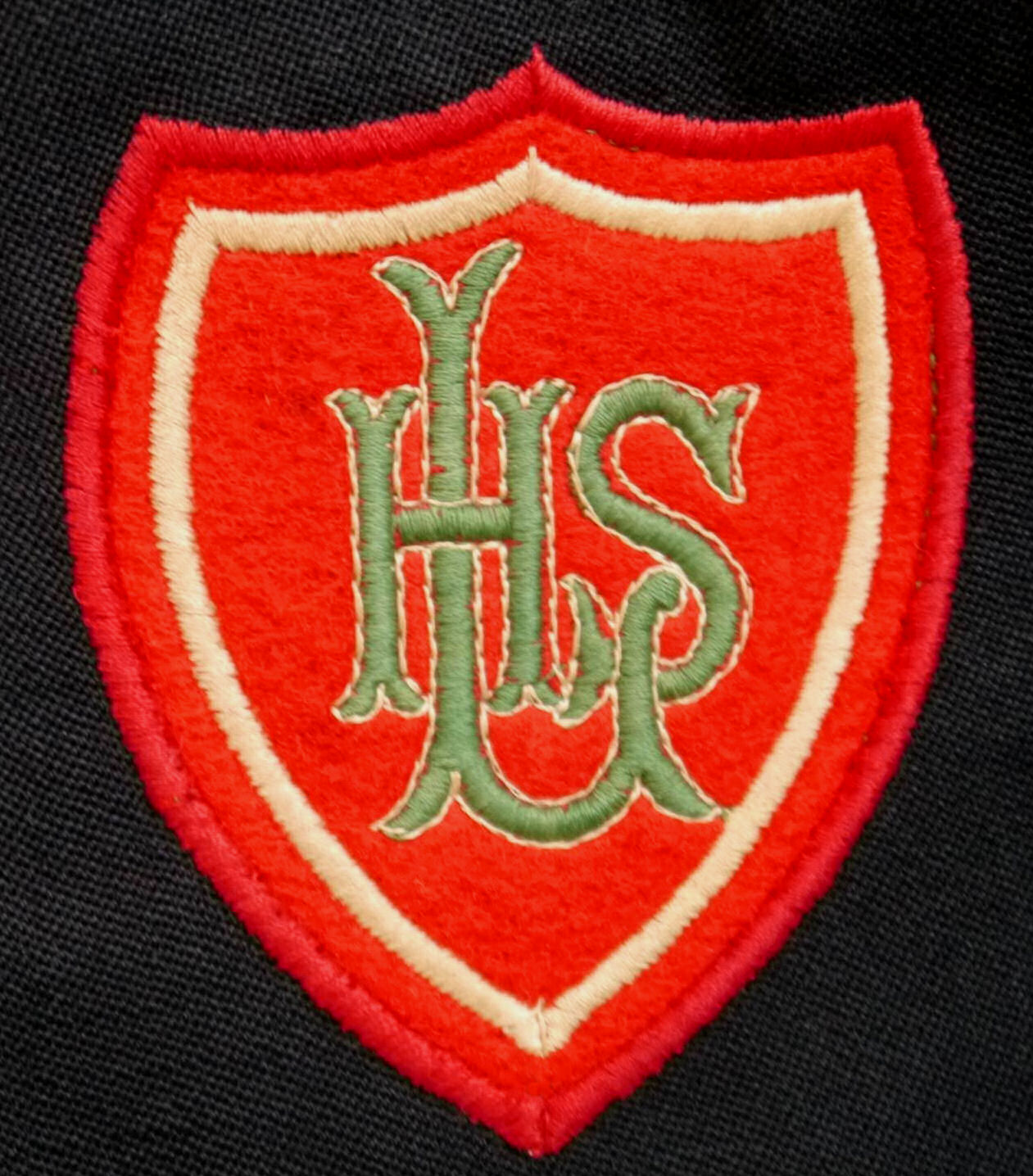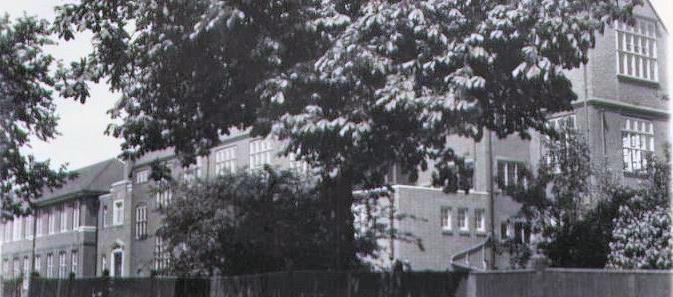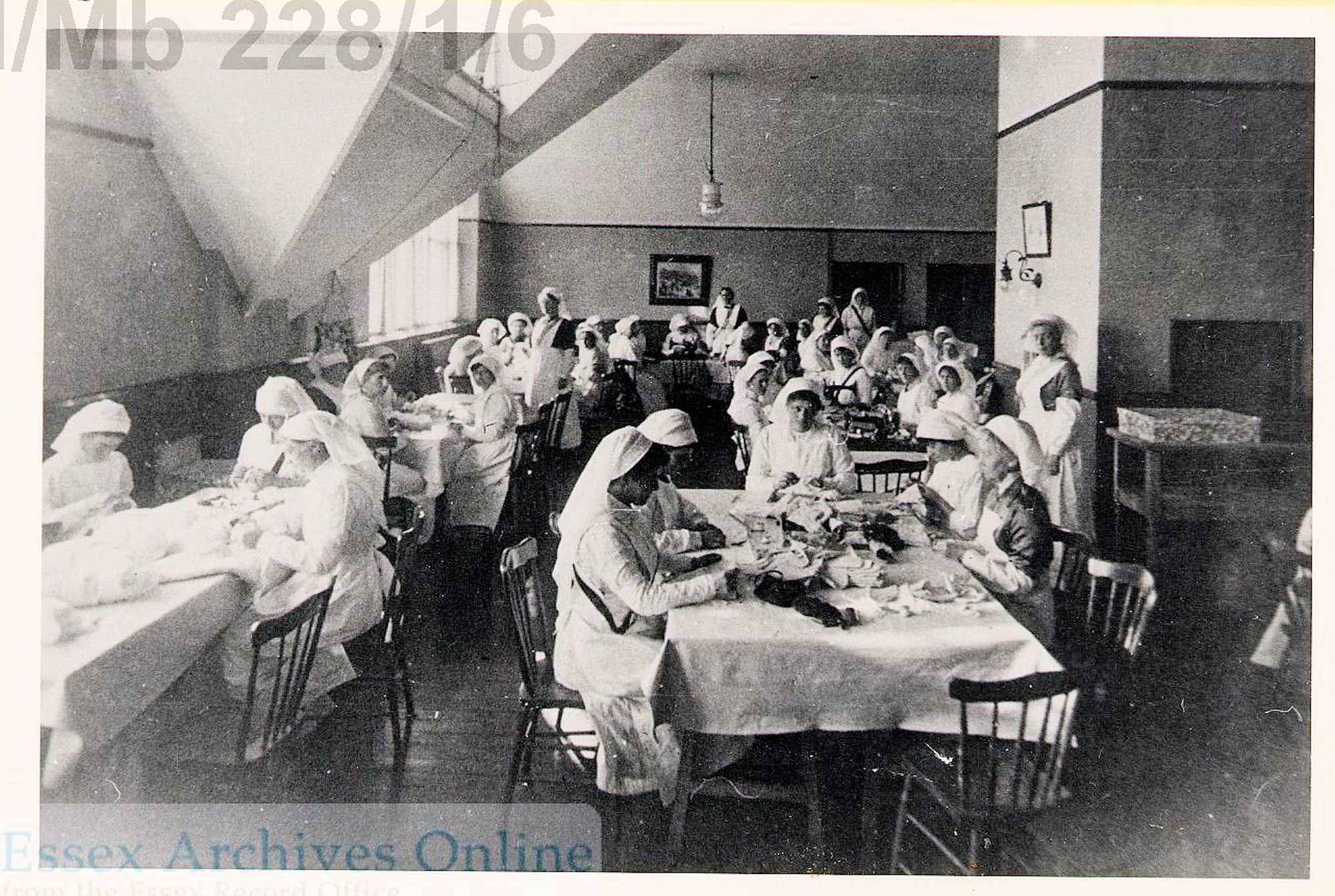
Loughton County High School for Girls




Copyright © 2014 by Susan Capes · All Rights reserved · E-Mail: sue@loughtonchs.co.uk
Loughton at War
Loughton and the World Wars
Loughton saw ‘active’ involvement in both world wars and true to form demonstrated the ‘keep calm and carry on’ attitude that is so associated with the school. The Michaelmas 1914 magazine reports:
“…in the face of the tremendous struggle in which our country is involved, some of us may perhaps have thought that they had no time or inclination to write for the magazine………..the thought - if it existed- was a foolish one.”
At this time there were approximately 150 pupils in the school covering both junior and senior school. The handwritten magazines of the time, edited by Miss Darch, are peppered with writings on the war, both prose and verse and usually focussed on the life of the Tommies. However they occasionally reflected on the impact of the war at home. In 1915 one pupil wrote:
“I had a letter from my cousin(sic). It came by first post. We haven’t got any second post now. We used to have. But the postmen are too expensive. That’s because of the war. Everything is because of the war.”
Others wrote:
“I have seen lots and lots of soldiers. Some of them were fat but there were lots of thin ones.”
“I do love singing the national anthem. I am learning all sorts of ‘songs’(sic). I didn’t know a lot before. There is one that begins ’It’s a long way to Tipperary’.
There is also early evidence of Loughton’s role in supporting the wider community with involvement in the National Relief Fund and reports that:
“we have now adopted five(prisoners of war) and it is hoped we shall not lose sight of them, even though the relief scheme has been taken off the Red Cross. If we send our contributions to the many various regimental organisations who forward parcels these will be sent in our name and we will receive letters from our prisoners as usual”.
It is known that Loughton provided facilities to support the war effort. It seems that in the First World War the school was used as a war hospital depot - a picture survives depicting this in the Essex Record Office.
The school magazines in the period 1939 to 1945 paint a much clearer picture of the impact of the second world war on school life as the following extracts show.
In the period immediately before the commencement of WW2 the 1939 magazine reports that:
“we shared part of our school with a territorial detachment and prepared for evacuation.”
We also know that during the Second World War:
"The Auxiliary Fire Service commandeered our school swimming pool. An anti-aircraft gun was also put in position on one of the school playing fields and soldiers took over the gym. Children were warned not to look across at the soldiers in the field and certainly not to speak to them."
(Memory of CSV Devon on BBC WW2 Peoples War web page)
By 1940 the magazine tells us:
“Speech Day is a minor war casualty, the loss of which some of us may be tempted not to regret.”
“When we were first able to reopen (school) in October, at least we had more chance of getting to know one another, for the un-evacuated remnant might only attend school in four small batches for reasons of safety, which meant, for a short time, most of us came to school only every other day. Gradually, however, our evacuated members returned and with the temporary addition of some girls from other schools, we are now as big as ever and have, for some time, been attending school normally."
In 1940 former teacher and author Miss Darch wrote back to school telling them:
“I am billeting officer for Ashington. It was pretty strenuous in September and still presents its problems, while it takes up so much of my time that I cannot write - at least so far. However, I had a story - my 18th - out last autumn.”
By 1941 the Blitz was in full swing but:
“Though right amid the Metropolitan Blitz we have not missed one day of school attendance for the last year.”
All this was despite the fact that:
“We have indeed been without a gym, without ceilings and panes of glass and bombs around us and planes overhead, with shattered homes, with trains that failed us or demanded sudden, unexpected closures to the station, with trenches that leaked and shelters approached through squelching mud, with changed menus and juggled timetables,…..one need not prolong the list.”
Still the Loughton spirit triumphed:
“We are now making comforts for the Forces and clothes for refugees and evacuees, in addition to maintaining our regular supply of miscellaneous goods to the UGS”
(We think this is the Union of Girls Schools (for social services) which Loughton joined in 1939.)
“After more than eighteen months of war, it is interesting to see how our school music has developed. Little did we dream how valuable it would be in shelter life.”
“……………..clubs have continued to function throughout the year, despite the Luftwaffe’s apparent preference of Wednesday and Thursday afternoons as suitable for aerial excursions.”
By April 1942:
“The cessation of the Blitz enabled some of us, in the summer, to make occasional journeys to the theatre.”
“Although the normal routine of school life has been more nearly approximated to this year than last, we do not forget that we are living in a world at war, and perhaps because of the privileges we enjoy, we realise something of the issues at stake.”
School magazines were more condensed during this period as paper restrictions had an impact.
Life began to get easier by May 1943 as:
“we have increased our usual activities, and because of raid free days, many more visitors have been able to come and see us.”
“The school has worked harder than ever for the war effort and social service. Besides the three forces ,we have knitted for Indian troops, and for the Russian army and civilians, and our salvage campaign supplies the necessary money for the wool.”
This improvement in the pattern of school life continued as by May 1944:
“The war is still affecting school………….but it has not interrupted or normal activities…”
The end was in sight as in May 1945 as:
“our summer games suffered greatly from the effect of flying bombs and no matches took place, but the winter games are gradually assuming their pre-wartime importance now that most schools have returned from evacuation.”
Miss Verini, who left Loughton in 1945 wrote:
“…………..my greatest pride will be to have shared its (LCHS) war years - blitz, fire watchings, flying bombs, rockets, all thrown in… to have done what I could to carry the bridge across these waters of war problems from the school’s foundation years to what we hope will be the firm landing of the post war years.”
Her successor, Miss Heald, the link to the past for most of us, wrote:
“I have been fortunate to come to Loughton at a time when the ceaseless anxiety of the war years is happily at an end………………The benefits of the 1944 Education Act are necessarily only just beginning to be felt.”
Loughton saw ‘active’ involvement in both world wars and true to form demonstrated the ‘keep calm and carry on’ attitude that is so associated with the school. The Michaelmas 1914 magazine reports:
“…in the face of the tremendous struggle in which our country is involved, some of us may perhaps have thought that they had no time or inclination to write for the magazine………..the thought - if it existed- was a foolish one.”
At this time there were approximately 150 pupils in the school covering both junior and senior school. The handwritten magazines of the time, edited by Miss Darch, are peppered with writings on the war, both prose and verse and usually focussed on the life of the Tommies. However they occasionally reflected on the impact of the war at home. In 1915 one pupil wrote:
“I had a letter from my cousin(sic). It came by first post. We haven’t got any second post now. We used to have. But the postmen are too expensive. That’s because of the war. Everything is because of the war.”
Others wrote:
“I have seen lots and lots of soldiers. Some of them were fat but there were lots of thin ones.”
“I do love singing the national anthem. I am learning all sorts of ‘songs’(sic). I didn’t know a lot before. There is one that begins ’It’s a long way to Tipperary’.
There is also early evidence of Loughton’s role in supporting the wider community with involvement in the National Relief Fund and reports that:
“we have now adopted five(prisoners of war) and it is hoped we shall not lose sight of them, even though the relief scheme has been taken off the Red Cross. If we send our contributions to the many various regimental organisations who forward parcels these will be sent in our name and we will receive letters from our prisoners as usual”.
It is known that Loughton provided facilities to support the war effort. It seems that in the First World War the school was used as a war hospital depot - a picture survives depicting this in the Essex Record Office.
The school magazines in the period 1939 to 1945 paint a much clearer picture of the impact of the second world war on school life as the following extracts show.
In the period immediately before the commencement of WW2 the 1939 magazine reports that:
“we shared part of our school with a territorial detachment and prepared for evacuation.”
We also know that during the Second World War:
"The Auxiliary Fire Service commandeered our school swimming pool. An anti-aircraft gun was also put in position on one of the school playing fields and soldiers took over the gym. Children were warned not to look across at the soldiers in the field and certainly not to speak to them."
(Memory of CSV Devon on BBC WW2 Peoples War web page)
By 1940 the magazine tells us:
“Speech Day is a minor war casualty, the loss of which some of us may be tempted not to regret.”
“When we were first able to reopen (school) in October, at least we had more chance of getting to know one another, for the un-evacuated remnant might only attend school in four small batches for reasons of safety, which meant, for a short time, most of us came to school only every other day. Gradually, however, our evacuated members returned and with the temporary addition of some girls from other schools, we are now as big as ever and have, for some time, been attending school normally."
In 1940 former teacher and author Miss Darch wrote back to school telling them:
“I am billeting officer for Ashington. It was pretty strenuous in September and still presents its problems, while it takes up so much of my time that I cannot write - at least so far. However, I had a story - my 18th - out last autumn.”
By 1941 the Blitz was in full swing but:
“Though right amid the Metropolitan Blitz we have not missed one day of school attendance for the last year.”
All this was despite the fact that:
“We have indeed been without a gym, without ceilings and panes of glass and bombs around us and planes overhead, with shattered homes, with trains that failed us or demanded sudden, unexpected closures to the station, with trenches that leaked and shelters approached through squelching mud, with changed menus and juggled timetables,…..one need not prolong the list.”
Still the Loughton spirit triumphed:
“We are now making comforts for the Forces and clothes for refugees and evacuees, in addition to maintaining our regular supply of miscellaneous goods to the UGS”
(We think this is the Union of Girls Schools (for social services) which Loughton joined in 1939.)
“After more than eighteen months of war, it is interesting to see how our school music has developed. Little did we dream how valuable it would be in shelter life.”
“……………..clubs have continued to function throughout the year, despite the Luftwaffe’s apparent preference of Wednesday and Thursday afternoons as suitable for aerial excursions.”
By April 1942:
“The cessation of the Blitz enabled some of us, in the summer, to make occasional journeys to the theatre.”
“Although the normal routine of school life has been more nearly approximated to this year than last, we do not forget that we are living in a world at war, and perhaps because of the privileges we enjoy, we realise something of the issues at stake.”
School magazines were more condensed during this period as paper restrictions had an impact.
Life began to get easier by May 1943 as:
“we have increased our usual activities, and because of raid free days, many more visitors have been able to come and see us.”
“The school has worked harder than ever for the war effort and social service. Besides the three forces ,we have knitted for Indian troops, and for the Russian army and civilians, and our salvage campaign supplies the necessary money for the wool.”
This improvement in the pattern of school life continued as by May 1944:
“The war is still affecting school………….but it has not interrupted or normal activities…”
The end was in sight as in May 1945 as:
“our summer games suffered greatly from the effect of flying bombs and no matches took place, but the winter games are gradually assuming their pre-wartime importance now that most schools have returned from evacuation.”
Miss Verini, who left Loughton in 1945 wrote:
“…………..my greatest pride will be to have shared its (LCHS) war years - blitz, fire watchings, flying bombs, rockets, all thrown in… to have done what I could to carry the bridge across these waters of war problems from the school’s foundation years to what we hope will be the firm landing of the post war years.”
Her successor, Miss Heald, the link to the past for most of us, wrote:
“I have been fortunate to come to Loughton at a time when the ceaseless anxiety of the war years is happily at an end………………The benefits of the 1944 Education Act are necessarily only just beginning to be felt.”
Many thanks to Christine Spencer - what a mammoth amount of work went in to finding all these quotes and summarising them so well
Click to
enlarge
enlarge
